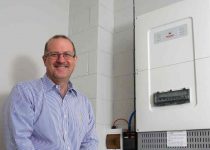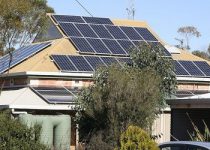Solar, Storage and Distributed Energy News
All eyes on Australia battery market, as home storage becomes a “need”

One Step Off The Grid spoke to SolarEdge’s co-founder and VP of marketing and product strategy, Lior Handelsman, at last week’s All-Energy Australia conference in Melbourne.
The Israel-based company had a big and buzzing stand in what ranked as one of the busiest and most up-beat exhibitions of renewable energy technology in years for the annual event.
SolarEdge, which claims to be the world’s biggest PV inverter company in the world in terms of revenue, has long dominated the global residential and commercial solar markets in this segment.
But like many others in this space, it has been broadening its offering to include PV panels, smart control systems, battery storage and – as reported on The Driven recently – EV charging technology.
According to Handelsman, the company is still making the vast bulk of its revenue from its inverter sales around the world. But that is changing. And on this front, Australia is a key focus market.

“So we see installers selling it better, pitching it better, and [consumers] realising that there are other values – beyond ROI – in solar plus storage, such as being sustainable, being independent and having resiliency,” Handelsman told One Step.
“We would actually see two trends that are pushing this. The first is necessity – there are markets where you have such a high penetration of solar that you cannot sell just solar any more. The market won’t allow it, or the regulation won’t allow it, or the utility or grid connection won’t allow it.
“In this market, installers have become, out of necessity, very, very good at selling storage, because a) they have no choice, and b) there is still ROI, just a little longer and sometimes different.
“The other thing which is also interesting, in my view, and I see it in Germany and Europe, is that there are people buying solar and storage in places where it doesn’t make (economic) sense to buy.
“When I ask system owners [why they do this], they tell me something that we’re not used to hearing in the solar industry, and that is ‘when I buy air conditioning I don’t think about pay-out, I need it.’
“And I say, ‘Yes, but you don’t need a battery. The grid is good, you don’t need a battery.’ And the customers says, ‘For me, not being sustainable, for me being dependent on fossil fuel energy, it’s painful. It’s painful like being cold in the winter. I need a battery’.”
In the US, Handelsman says installers are hearing the same sort of thing, but in that case it is more due to a desire to be independent from the grid, in response to the increasing threat of extreme weather events like wildfires and hurricanes that can knock out power supplies for days and even weeks.
“So people say, I need a battery… And then, on top of that, there’s a lot of value stacking, such as maximising solar self-consumption, tapping into a VPP (virtual power plant),” and, of course, powering the family’s electric vehicle.
“The EV is going to be your biggest load. In the coming 20-15-10 years, we’re all moving to an EV, and it’s going to be your biggest load in the home, so it makes all the sense to optimise that solar consumption
“And this brings us to the next stage of solar,” he says. “Solar will be the grid, your car will be the grid, and we will use solar inverters and VPPs to manage that load.
“Solar, cars, battery storage, it’s all going to be one thing.
“What we’re doing now will determine how our grid will behave 10, 20 years from now. It’s super exciting for us. And in all of this, Australia is one of the leaders, it’s not a laggard,” Handelsman says.
“We see more understanding, openness and experimentation on the grid in virtual power plants here, pretty much than any other place in the world.
“There’s lots of openness in Australia, less fear. In some places in the world there’s lots of fear.
“Australia is definitely not a laggard in this. But it also makes sense to be careful, nobody wants lots of outages.”

Sophie is editor of One Step Off The Grid and deputy editor of its sister site, Renew Economy. Sophie has been writing about clean energy for more than a decade.




Ask the PV panel owners in California about my first sentence…..